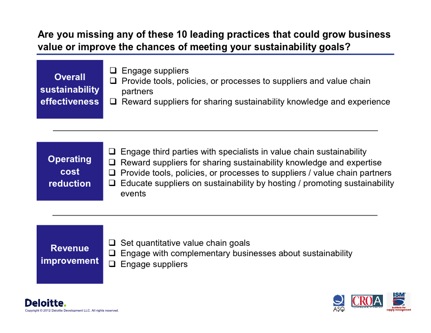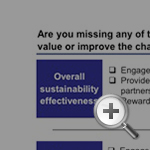Sustainability Goals — Thinking About What Works and What Doesn’t
New research shows which sustainability practices have a statistically significant impact on the overall success of the sustainable value-chain initiatives measured, their cost savings, and their revenue impact.
Topics
Leading Sustainable Organizations
“Wouldn’t you like to do more of what tends to work, and less of what may not work?”
That’s the question posed by Dan Aronson in his breakout session on the results of his research on sustainable value chains at the fifth annual MIT Sustainability Summit, held April 27–28 on campus at the MIT Media Lab.
Aronson, a Sloan alum who is currently the Director of Sustainable Services with Deloitte Consulting, set out to identify specific management practices that help companies with their sustainability goals. He and his colleagues emphasized that their research was focused on the entire value chain — suppliers, distributors, and partners — rather than simply analyzing the sustainability of particular organizations’ supply chains.
Their first step was to review all the sustainable supply-chain studies from the last five years in order to build on what was already known and avoid duplication. Working with input from the American Society for Quality (ASQ), the Corporate Responsibility Officer Association (CROA), and the Institute for Supply Management (ISM), they developed hypotheses and designed questions focused on figuring out “what has worked.” Then they surveyed almost 1,000 practitioners about their practices and performance, more than three quarters of whom were from for-profit companies, with the majority headquartered in North America.
Figure 1

After analyzing results and controlling for key factors, it became clear which sustainability practices have a statistically significant impact on three key parameters: the overall success of the sustainable value-chain initiatives measured, their cost savings, and their revenue impact. The leading practices that showed particular effectiveness were clustered around three areas: engagement, goals and standards, and — “fortunately for me,” quipped Aronson — “outside expertise.”
The idea that engaging with suppliers could lead to better outcomes is not surprising; however, many organizations could truly engage more, beyond just throwing a directive over the wall to their suppliers. It’s not necessarily difficult work, it just means working differently — having conversations about expectations and requirements, and sharing the kinds of processes and policies that have been successful for others, or inviting suppliers to collaborate on new solutions.
The research showed that different management practices support different objectives. Some practices, however, can support multiple objectives.


 View Exhibit
View Exhibit
Comment (1)
Praveen Kambhampati